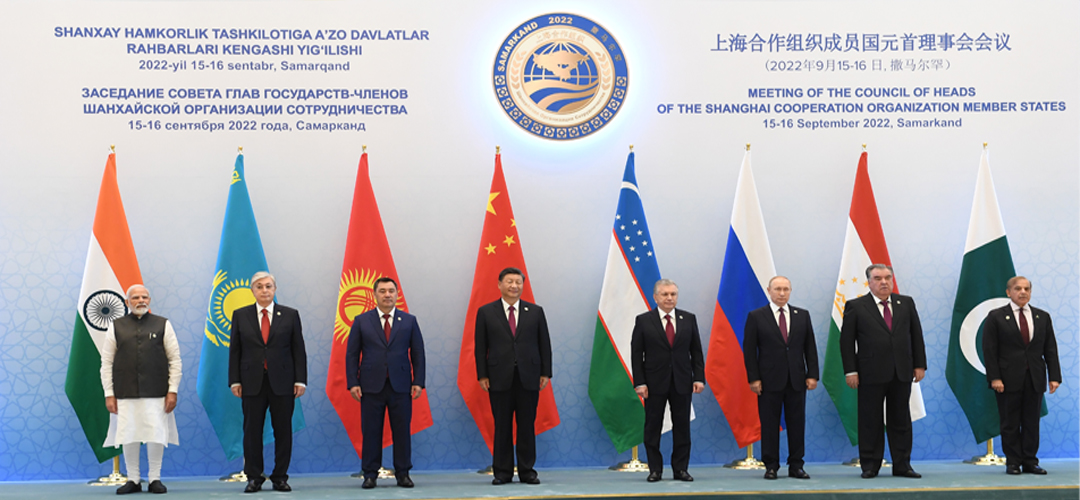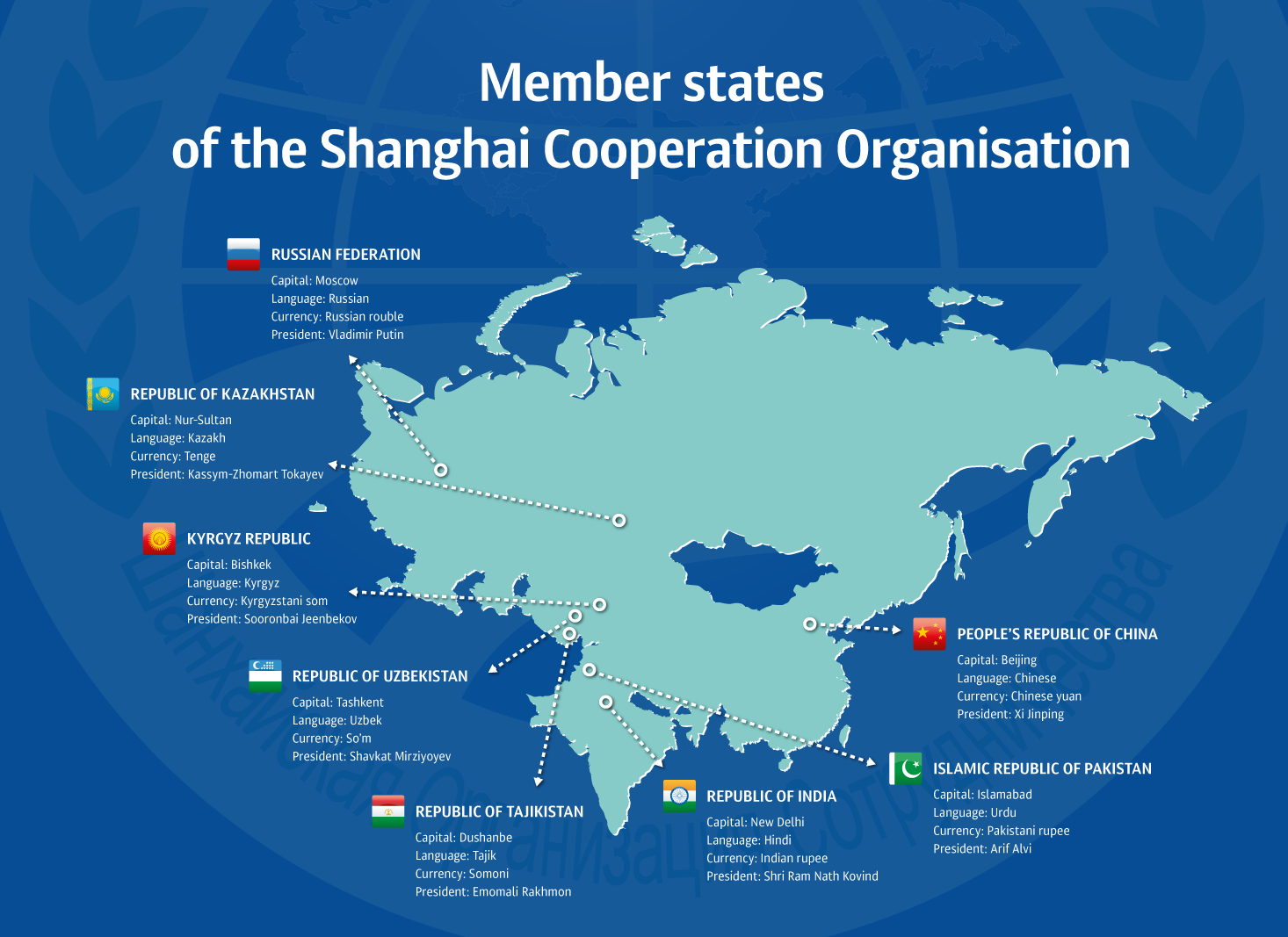India- Pakistan and the SCO
July 8, 2023 | Expert Insights

For a long time, India and Pakistan have been hyphenated with each other. Sadly, this troubled relationship infects any bloc or grouping that both join as it becomes an arena for mutual recriminations and accusations. This not only shifts the attention of the forum from more pressing issues but also poisons the atmosphere under which such gatherings take place. The SAARC is almost a dead organisation thanks to this bitter rivalry between the two neighbours.
In the recently concluded SCO virtual summit under the chairmanship of India, this phenomenon was again witnessed, with both countries taking potshots at each other to score diplomatic points. Sadly, this only marginalises the efficacy of the multilateral platform, especially when the two members are influential. Even if there is a marked difference in the national power and economic value of each member of the organisation, the forum permits each member, big and small, to make a constructive contribution for the overall benefit of the group.
Background
Eurasia as a concept is expansive in its scope. This concept looks beyond any specific geographical area and seeks to build inter-regional connectivity. In the Eurasian case, these are the pivotal regions of Central Asia, the Middle East and South Asia. Along with this, there are the behemoths of Russia and China. The SCO was formed to bring this idea to fruition.
Following the start of the Russia-Ukraine war, the SCO has taken a different colouring. It is being used to bring together all countries who oppose the Western discourse on this war. Pakistan is one such country. India is another. But the context could not be more different for the two. India has taken a principled stand on this war. Pakistan has taken an opportunistic one.
Both India and Pakistan joined the SCO at the same time. But the net impact has been vastly divergent. India is a respected voice within the SCO and other regional organisations. It shapes policy through regional mechanisms. On the other hand, Pakistan has used the SCO to highlight its grievance on Kashmir, a domestic political compulsion rather than an international concern at this juncture for want of any better or meaningful suggestion. Like a baited tiger, India characteristically retorts in equal measure.

Analysis
The SCO emerged from the need to address the security concerns of the region, which were increasingly becoming transnational, especially the threat from the spread of radical Islam and the drug networks centred in and around Afghanistan.
India and Pakistan have been deeply impacted by security threats for more than four decades now and have a stake in crushing this danger. But, obviously, myopic short-term strategic goals, like Pakistan's claim to a 'strategic depth' in Afghanistan, the use of 'strategic assets' (non-state actors) to pursue foreign policy objectives clash with the security interest of not only India but also other SCO members from Central Asia and the Russian Federation. Since the SCO, in its current format, cannot produce a ticket for Pakistan out of its economic morass, the incentive to use the platform constructively is non-existent.
The SCO, under Beijing and Moscow, has an entirely different agenda. It desperately seeks willing partners in a rapidly shrinking international congregation to face up to the West led by the USA. Pakistan, and to an extent even India, does not fit this definition. However, both, in their own way, would support the strengthening of multilateral organisations that are relatively free from overpowering Western influence.
The evolving bilateral relationship between SCO members is also complex. Indo -Russian relations are under a cloud due to the growing closeness of New Delhi with Washington and the emergence of the so-called China -Russia axis after the Ukraine invasion. Russia has also not concealed the fact that it is interested in wooing Pakistan.
SCO will not be the golden ticket for Pakistan out of its present morass. Outside powers will not be able to solve Pakistan’s problems. They might be able to help. But that is how far they will be able to go.
India has to move forward with its Pakistan fixation, especially when addressing important multilateral foras like the SCO. The vast gulf in comprehensive national power between the two nations is clear to all its SCO partners, and their approach would be accordingly framed.
India is an asset to the SCO in more ways than one. Today India is a multi-connected country- New Delhi has membership in different global fora with varying ideological colourings. This gives huge leverage to India. Its voice has weightage for both sides. This has become abundantly clear during the ongoing Russia-Ukraine war. Unlike other countries, India is not in the SCO to challenge the international order. Rather the SCO is just one more toolkit in the foreign policy arsenal of New Delhi.
The SCO will never become either a Chinese or a Russian playground. It will remain a regional organisation with considerable differences among its member states. Pakistan now needs economic assistance from all corners of the world. The SCO is just one more forum where this requirement is highlighted. With big brother China by their side, the Pakistanis have a friend in the SCO. But this goes so far only as it serves Chinese interests, not Pakistani ones. Islamabad has no leverage in its SCO membership. It is just being used as a tool by the other powers for their benefit.
The Chinese have got to stop using the SCO or any other supra-national fora to contain India. Beijing has promoted its Belt and Road Initiative within the framework of the SCO. India has opposed this Chinese economic imperialism and will continue to do so.
New Delhi has never deflected any regional organisation for its national interest. India’s SCO membership is for its benefit without harming any other country.
Assessment
- India and Pakistan must restrain themselves while attending multilateral platforms like the SCO. These are not opportunities for pushing their respective agenda targeting each other but a gathering of like-minded nations with concerns that need a collaborative effort from all members.
- The issue of terrorism affects all SCO member countries. It is top on the priority list of this organisation. As an SCO member, Pakistan cannot escape from addressing this issue.
- On its part, as the third largest member of the SCO, India has a much greater responsibility than Pakistan to make SCO a meaningful and credible multilateral organisation.








Comments